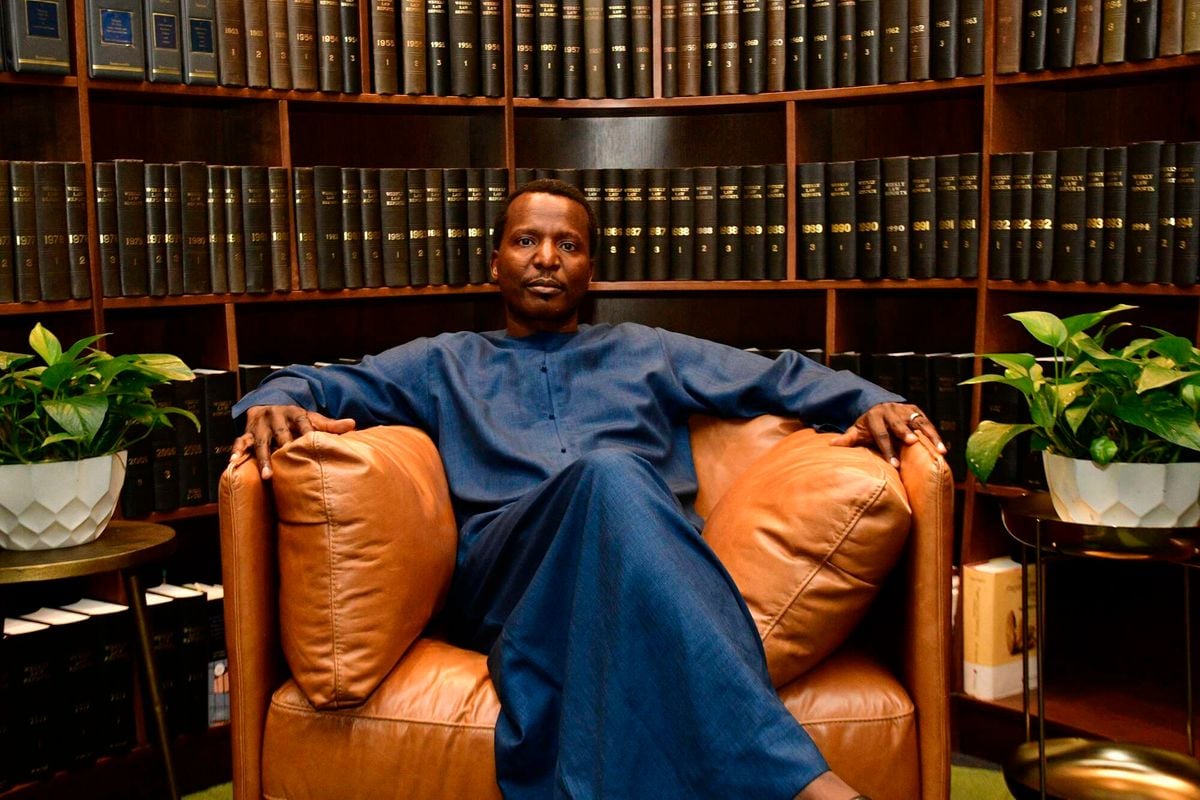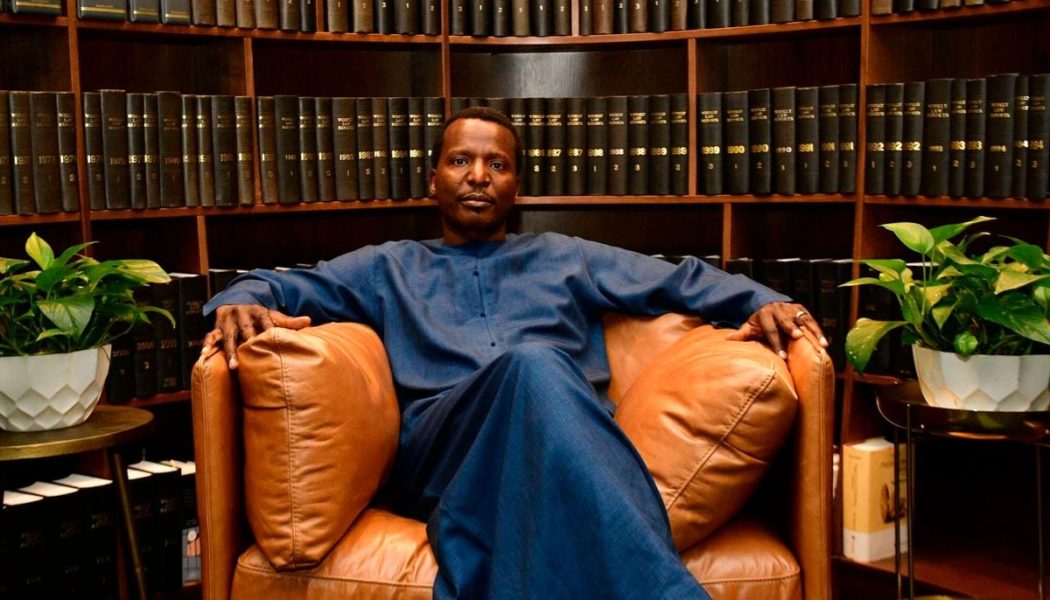
When you meet Ben Mosota, two qualities strike you right away: his love for smelling good and his aversion to fame.
As the founder and managing partner of MMA Advocates LLP, Mr Mosota has quietly shaped a formidable legal career, opting to let his work speak for itself rather than chase the spotlight.
Mr Mosota’s liking for exquisite scents is evident long before I meet him. His office has an abundance of greenery. It has rubber plants, golden pothos, arrowheads, and even an Arabica coffee plant, all in pots.
“I love plants, I love nature,” he says with a smile, his eyes reflecting his calm and grounded personality.At 41 years old, Mr Mosota’s journey to becoming a lawyer was predestined. “Growing up, my mother always said I was too argumentative. My natural inclination towards debate and reason made law a fitting career choice,” he says, laughing.
After completing his law degree at Makerere University in 2007, he proceeded to the Kenya School of Law.
“There was no employment waiting for me after graduation. It was a tough period. I hustled, doing everything from incorporating companies to holding briefs, slowly building my career brick by brick,” he recalls.
His breakthrough came when he secured a position working with Ahmednassir Abdullahi, one of Kenya’s senior counsels. “I landed a job working with Mr Abdullahi editing the Nairobi Law Monthly. Later I joined Mr Abdullahi’s law firm. After three years, in 2013, I branched out and started my own firm, MMA Advocates LLP,” he tells the Business Daily.
Despite being a successful lawyer, Mr Mosota remains averse to public attention. “Publicity will come when you’re handling a high-profile case, but there’s little value in just being known for being in the spotlight. Some clients are very sensitive about publicity, and in law, discretion is key. Most of the cases I handle are based on my track record.
Clients come to me because of what they’ve heard about my work, not because I’m in the news,” the lawyer with over 15 years of experience says.
“In the legal field, your best reference is the last client you handled. If a client asks you to do something small and you do it very well, they will entrust you with bigger projects. As it’s said, to whom much is given much is expected. If you are faithful in the little things, then you will be trusted with the bigger things.”
A typical day for Mr Mosota starts early. “By 4:45 am, I’m up. I take a cold shower, read essential surahs from the Quran, jog to the mosque for my morning prayers, and then jog back home and get ready for work,” he says.
Cases he cannot handle
Mr Mosota is now in what he calls the preferment stage of his career. “I choose the cases I handle. I’m an essentialist so I prefer to do a few things but do them exceptionally well. Predominantly, I handle commercial disputes and public law litigation, areas where I believe I can make the most impact with my skills.”
Despite his broad legal knowledge, he prefers to avoid taking on some cases.
“Family disputes; succession matters, and insurance accident cases, for instance, I often refer to colleagues. They can be incredibly time-consuming, and the real issues often only emerge much later. In family cases, for example, a lot of emotion and non-legal matters cloud the beginning stages of the dispute. In commercial litigation, the issues are much clearer: is there a contract? Was there a breach? These are the kinds of legal questions I enjoy solving.”
His Islamic faith also influences his choice of cases he can and cannot handle. “For Muslims, the Quran provides clear guidance on matters like succession. Disinheriting an orphan is one of the worst sins, and that’s why I prefer not to take on such cases,” he says.
“My faith has taught me contentment. Temptations arise when you want more than what is meant for you, but I believe that what God has written for me will come to me, even if it takes a year or two. This understanding has brought me peace.”
Having been born and raised Catholic, he says that his shift to Islam was influenced by the work he did for and with Muslims.
“I grew up Catholic in Kisii, but as I started working with Muslims, I was drawn to their values. Their honesty and their integrity inspired me. I watched how they carried themselves and what they refrained from doing, and it resonated with me.”
He converted to Islam and later married a Muslim woman, a union that further anchored his faith. “Since then, I’ve made better decisions than I did before. Islam has taught me not to rush for things or desire too much. Everything will eventually come in due time.”
When Mr Mosota is not immersed in the law, he’s an avid reader. “Every time I travel, I make sure to have a book with me,” he says.
“Right now, I’m reading Essentialism: The Disciplined Pursuit of Less by Greg Mckeown. It is a beautiful read that teaches the importance of focusing on fewer, more important things. It has really helped me manage my time and become more effective in both my personal and professional life.”
His weakness
His most significant indulgence? Perfumes. “As a Muslim, we are taught that the angels like where there is good scent. Recently, I was speaking with my Sheikh and he told me that while Islam discourages extravagance it is allowed when it comes to perfumes.
He said even if you spend half of your money on perfumes, it is not haram. I love perfumes. I can spend maybe Sh300,000 buying a bottle of perfume. Perfume is my indulgence. Recently, I’ve found myself drawn to Frederic Malle scents,” he shares.
So strong is his love for perfumes that his love language is gifting perfumes. “For every friend of mine, the greatest gift I have given is perfumes.”
Mr Mosota is also a car enthusiast. “I enjoy the thrill of the ride. I love cars so much so that every year I try to buy atleast one car. My favourite is a VW Touareg that I bought 11 years ago. I love that it has power and blends in easily with other cars. However, all this is part of the vanity of the human being. I like cars but I don’t like them to possess me,” he says.
Along with his professional pursuits, Mr Mosota is deeply committed to giving back. “At the law firm we spend a lot of time and resources in corporate social responsibility, especially supporting orphanages and helping children get through school. It’s a way of staying grounded and making a difference where it matters most.”
Fatherhood
The father of two says that fatherhood has taught him a lot of patience. “Sometimes I think my son has to be like me, I have to teach him. Again, fatherhood makes you vulnerable and a little softer,” the holder of a Master’s in Public Policy says.
One thing that matters far less to him now than it once did? Fame.
“When I was starting out in my career, I thought that I must be very famous and be all over the place. This doesn’t matter to me anymore.The value in law is in delivery; giving solutions to your client. What is the value of having a lot of publicity but you have lost the case? What is the value of publicity when your client still has a problem? I want to provide my client with a solution first then if fame comes as a result of it, then that is well and good,” Mr Mosota says.
Ultimately, Mr Mosota believes that humility is key. “As Muslims, we’re called to humility. When you exalt yourself, you fall harder when things go wrong. I prefer to stay grounded and let my work speak for itself.”









